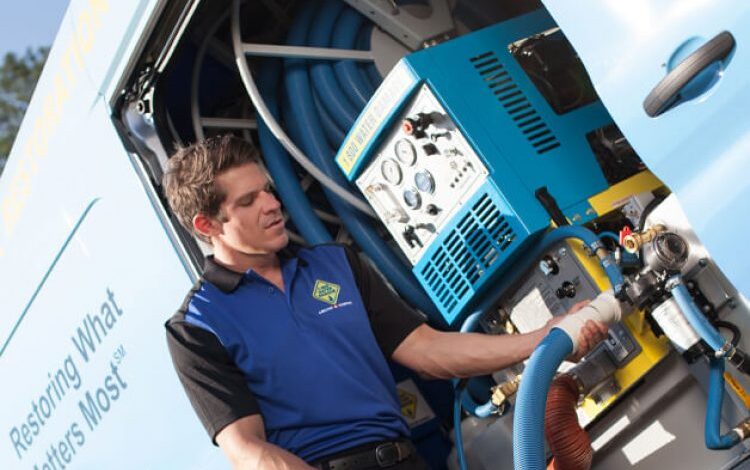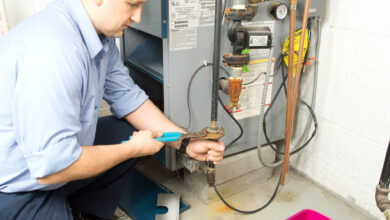Reviving Your Home: Water Damage Services in North Georgia

Key Takeaways:
- Water damage can result from plumbing issues, natural disasters, malfunctioning appliances, structural issues, condensation, and humidity.
- Water damage can cause immediate effects such as ruined carpets and furniture, as well as long-term issues like structural damage and mold growth.
- When hiring a water damage restoration company, look for a proven track record, quick response times, and comprehensive services.
- It is recommended to hire professionals for water damage restoration to ensure effective handling, identification of hidden moisture, and assistance with insurance claims.
- The water damage restoration process involves assessment and inspection, water extraction and drying, and repair and restoration of damaged areas.
- To prevent future water damage, maintain proper drainage systems, regularly inspect and maintain plumbing systems, and implement effective flood prevention measures.
Understanding Water Damage: Causes and Effects
Water damage can be a devastating issue for homeowners, causing extensive and costly damage to their properties. It can result from a variety of causes, with each having its own set of effects on the structure and integrity of a home.
The Common Causes of Water Damage
One of the most common causes of water damage is plumbing issues. Burst pipes, faulty faucets, or leaking fixtures can lead to significant water leakage, causing damage to walls, floors, and ceilings. Another frequent cause is natural disasters such as hurricanes or heavy rainfall, which can cause flooding and can lead to water infiltrating the home. Additionally, malfunctioning appliances like washing machines, dishwashers, or water heaters can also be culprits of water damage.
Moreover, structural issues, such as a damaged roof or compromised foundation, can allow water to seep into the home, leading to water damage over time. Finally, condensation and humidity can cause moisture buildup, promoting the growth of mold and mildew, which not only damages the structure but also poses health risks to occupants.
The Devastating Effects of Water Damage
Water damage can have numerous detrimental effects on a home and its occupants. Immediate effects include ruined carpets, furniture, and personal belongings. Stained walls, warped flooring, and swollen ceilings are also common indicators of water damage. If left unaddressed, water damage can lead to structural issues such as weakening of the foundation, rotting of wood, and crumbling of drywall. These issues can compromise the stability of the entire structure, making it unsafe to inhabit.
Besides the physical damage, water damage can also result in the growth of mold and mildew. Mold can spread quickly, causing respiratory problems, allergies, and other health issues. Moreover, the presence of mold can decrease the air quality in the home, leading to an unpleasant and unhealthy living environment.
Choosing the Right Water Damage Restoration Company
When faced with water damage, it is crucial to hire a reputable Water Damage Services North Georgia to address the issue promptly and efficiently. However, with numerous companies to choose from, selecting the right one can be a daunting task. Here are some important qualities to look for when hiring a water damage restoration company.
Qualities to Look for in a Water Damage Restoration Company
First and foremost, it is essential to choose a company with a proven track record and extensive experience in water damage restoration. Look for certifications and accreditations that demonstrate their expertise and knowledge in handling water damage issues. A company that invests in ongoing training for its employees shows a commitment to staying updated with the latest techniques and technologies in the industry.
Another important factor to consider is the company’s response time. Water damage should be addressed promptly to minimize further damage and mold growth. Therefore, choose a company that can respond quickly to your call and can provide immediate assistance.
Additionally, it is crucial to select a company that offers comprehensive services. Water damage restoration involves several stages, including water extraction, drying, sanitizing, and repairs. A reputable company will have the necessary equipment and expertise to handle each stage effectively.
Comparing Water Damage Restoration Services in North Georgia
When looking for water damage restoration services in North Georgia, it is essential to compare the different companies and services available. Consider factors such as customer reviews, pricing, and the range of services offered. A thorough comparison will help you choose a company that not only meets your specific needs but also provides quality service at a reasonable price.
The Importance of Hiring Professionals for Water Damage Restoration
While it may be tempting to attempt DIY water damage restoration, it is highly recommended to hire professionals for this task. Professionals have the knowledge, experience, and equipment necessary to handle water damage effectively. They can identify hidden moisture, use specialized drying techniques, and ensure thorough restoration, preventing further issues such as mold growth.
Moreover, professionals can also assist with insurance claims, providing documentation and evidence of the damage incurred. This can significantly simplify the claims process and increase the chances of a successful claim.
The Process of Water Damage Restoration
The process of water damage restoration involves several important steps to ensure a comprehensive and effective restoration. Each step is essential in mitigating the damage and restoring the home to its pre-damage condition.
Assessment and Inspection of the Water Damage
The first step in the restoration process is a thorough assessment and inspection of the water damage. Professionals will evaluate the extent of the damage, identify areas affected, and create a plan of action. They will also check for potential hazards or safety risks that may need immediate attention.
During the inspection, professionals may use specialized equipment such as moisture meters and thermal imaging cameras to detect hidden pockets of moisture. This helps ensure that all areas affected by water damage are identified and properly addressed.
Water Extraction and Drying Techniques Used by Professionals
Once the assessment is complete, the next step is water extraction and drying. Professionals will use powerful pumps, vacuums, and dehumidifiers to remove water from the affected areas. This is followed by the use of drying techniques such as air movers and heat panels to facilitate the drying process.
Special attention is given to ensure that all moisture is thoroughly removed, including moisture trapped in walls, flooring, and other hard-to-reach areas. This helps prevent further damage and inhibits the growth of mold and mildew.
Repair and Restoration of Damaged Areas
After the water has been extracted and the affected areas have been thoroughly dried, the next step is the repair and restoration of the damaged areas. This may involve replacing damaged drywall, flooring, or ceiling materials, as well as repairing any structural issues that may have occurred.
Professionals will ensure that the restoration process is done to the highest standards, aiming to restore the home to its pre-damage condition. They will also take preventive measures to minimize the risk of future water damage, such as reinforcing plumbing systems and improving drainage systems.
Preventing Future Water Damage: Tips and Strategies
While water damage restoration can effectively address existing damage, taking preventive measures is essential to avoid future issues. Here are some tips and strategies to help prevent water damage in your home:
Maintaining Proper Drainage Systems
One of the most effective ways to prevent water damage is to maintain proper drainage systems around your home. Ensure that gutters and downspouts are clear of debris and are properly directing water away from the foundation. Regularly inspect and repair any leaks or blockages in the drainage systems to prevent water from infiltrating the home.
Regular Inspections and Maintenance of Plumbing Systems
Plumbing issues are a common cause of water damage, so regular inspections and maintenance of your plumbing systems are crucial. Check for leaks, drips, or signs of water damage around pipes, faucets, and fixtures. Repair any issues promptly and consider upgrading old plumbing systems to minimize the risk of future leaks.
Implementing Effective Flood Prevention Measures
If you live in an area prone to flooding, implementing effective flood prevention measures is essential. This may include installing flood barriers, elevating electrical systems, and sealing entry points where water can infiltrate. Additionally, consider having a sump pump installed to help prevent water from entering your basement during heavy rainfall.
By implementing these preventive measures and staying vigilant for any signs of water damage, you can minimize the risk of future issues and protect your home from the devastating effects of water damage.
FAQ
Question: What are the common causes of water damage? – Water damage can result from plumbing issues, natural disasters, malfunctioning appliances, structural issues, condensation, and humidity. Question: What are the devastating effects of water damage? – Water damage can lead to ruined carpets, furniture, structural issues, mold growth, and compromised air quality. Question: How do I choose the right water damage restoration company? – Look for a company with a proven track record, quick response times, and comprehensive services. Question: Why is it important to hire professionals for water damage restoration? – Professionals have the knowledge, experience, and equipment necessary for effective handling, identification of hidden moisture, and assistance with insurance claims. Question: What is the process of water damage restoration? – The process involves assessment and inspection, water extraction and drying, and repair and restoration of damaged areas. Question: How do I prevent future water damage? – Maintain proper drainage systems, regularly inspect and maintain plumbing systems, and implement effective flood prevention measures. Question: What are some tips for maintaining proper drainage systems? – Clear gutters and downspouts of debris, ensure proper water direction away from the foundation, and inspect and repair any leaks or blockages. Question: How can I implement effective flood prevention measures? – Install flood barriers, elevate electrical systems, seal entry points, and consider installing a sump pump in flood-prone areas.
Useful Resources:
- EPA Mold Course – Chapter 2
- Insurance Information Institute – Homeowners Insurance
- Centers for Disease Control and Prevention – Mold FAQs
- National Fire Protection Association – The Importance of Proper Fire and Water Damage Cleanup
- American Red Cross – Water Damage
- Federal Emergency Management Agency – Flood Recovery Process
- Asbestos.com – Asbestos Information
- Centers for Disease Control and Prevention – Hurricane Preparedness





